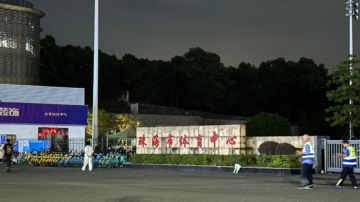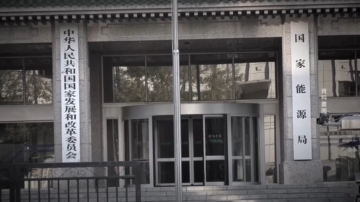【新唐人2012年7月6日讯】中国高增长的概念或许正在瓦解。美国媒体分析认为,由于银行系统不稳、作为整个经济体支柱的房地产市场即将崩溃,中国即将迎来一场盛大的硬着陆。美国华尔街做空大师查诺斯(Jim Chanos)对《巴伦周刊》说,如果说中国房地产市场即将到来的崩溃将达到迪拜泡沫的1,000倍,那还只是保守估计。
美国《华尔街日报》中文版转载《巴伦周刊》“中国高增长神话即将破灭?”文章,文章提出,中国是否正在接近一个特殊的时间点,那就是,很多曾经高速发展的经济体,在一个时间点,突然出现经济减速甚至收缩的情况。
内容提到,中国今年国内生产总值(GDP)的增长率可能会降到8%,之后可能还会进一步大幅下降。文章中也提及中国经过30年平均每年10%的增长之后,中国高铁速度一般的经济增长正在大幅放缓。而貌似坚若磐石的中国高增长概念正在显现越来越明显的裂痕,这不由让人想起25年前,当时日本经济正繁花似锦,然而却立即进入长达20年的低迷期。
对此,美国“纽约城市大学”经济学教授陈志飞分析,中国经济泡沫崩溃的严重性恐怕更甚于日本。
陈志飞:“但是日本进入衰退的时候它已经是一个世界的发达国家,而它已经在电子,在汽车各方面在全世界占立了一个主导地位。现在中国的平均收入只有日本的1/8,中国经济的技术含量上根本没有达到日本的这种水平。”
陈志飞表示,中国的经济衰退影响之广,令人忧心。
陈志飞说:“我们知道中国一直在提保8,如果经济增长低于8%的话,中国的职位、机会就要远远低于中国的就业人口,那么就会造成很大的经济问题,甚至是政治问题,那么它的这种衰退从强度范围来看,远远都要比日本所谓衰退20年,都要严重得多。的确是令人担忧,对全世界的影响也会非常大。”
《巴伦周刊》文章引述美国西北大学(Northwestern University)政治学专家史宗瀚(Victor Shih)的分析指出,如果把中国政府的“直接与或然债务”,和“国有银行系统、铁道部等各类政府实体、国有企业和地方政府融资平台的负债”,以及“国有企业交叉持有的大量债券”这三者加在一起,“中国政府债务”占GDP的比重将再增加两倍,达到150%左右,而且这个比例仍然在快速上升。
而中国银行业面临的巨大风险在于流动性危机,这可能会让很多坏帐像散发恶臭的搁浅鲸鱼一样,最终被暴露出来。
惠誉国际评级(Fitch Ratings)估计,中国的全部银行贷款中,大约有35%将承受中国房地产市场各种不确定性的影响。
而从中国各地堆积如山的空置高楼,可以看出房地产市场过剩的严重问题。
彼得森国际经济研究所(Peterson Institute)经济学家拉迪(Nicholas Lardy)指出,去年中国大陆的住房建设对中国GDP的贡献率为9.2%。相比之下美国在2006年房地产繁荣时期的这一比例也只有6%。在主要经济体中,只有西班牙曾经达到过这个水平,而那正是在西班牙楼市崩盘前夕。
拉迪等人担心,如果居住类房地产的销量和价格大幅下降,中国经济将有可能严重受损。钢铁、水泥和铜需求下降将使大量劳动者丢掉工作。
文章认为,尽管中国十二五规画朝向以消费为主导的经济型态,来重新平衡经济,但势力强大的特殊利益集团却在阻挠这类变革。
毕业于“哈佛大学甘迺迪政府学院”,研究中国问题的张而平分析指出,西方国家是国贫民富,中国却是国富民穷。
中国问题研究专家 张而平:“ 6:59在美国虽然人家国家政府欠了一定的债务,可是人家的老百姓的生活是得到保障的,在中国正好相反,老百姓民不聊生,政府拿到了很多钱,这是中国现在的现状。”
美国媒体综合中国目前的各种因素认为,中国通过解决自身的各种问题,成功实现经济高增长的可能性确实不大。
采访/ 常春 编辑/黄采文 后制/君卓
US Media: China Before “Hard Landing Of Epic Proportions”
China's notorious high growth rate' trend
seems to be heading down.
The country is before “a hard landing of epic proportions,”
due to its shaky financial system and an upcoming collapse of its real estate market, US media analyzed.
Wall Street short-seller Jim Chanos told Barron's,
that by a “conservative” estimate the coming China's property market bust will be 1,000 times that of Dubai's.
A recent article in Barron's, titled “Falling Star,”
looks at the issue of China's economy growth.
It asks if China is “nearing the point at which so many
high-octane growth economies suddenly decelerate or even contract.”
According to the article, China's 2012 GDP growth
“could slip to 8%—and it may get a lot worse from there.”
After 30-years of averaging 10% annual growth,
“China's bullet-train economy is slowing markedly.”
The “seemingly adamantine” “Great China Growth Story”
has shown “more and more apparent” cracks.
This reminds people of “the triumphalism extant
about Japan's prospects 25 years ago just before its economy went into a two-decade funk.”
Economics professor Chen Zhifei,
from City University of New York, analyzes the issue.
The expert thinks that China would see a much more
serious economic bubble burst than Japan.
Prof. Chen Zhifei: "Japan was a developed country,
when it fell into a recession.
It played a leading role in many areas
like in the electronics and car industries.
Now China's average income per capita
only accounts for 1/8 of Japan's.
Plus, the technical aspect of China's economy
hasn't yet reached Japan's level.”
The impact of China's economic recession
is worryingly widespread, says the expert.
Prof. Chen Zhifei: "China has long touted
to sustain a growth rate of 8%.
If it fails to do that, the unemployment issue will be strikingly
highlighted, which will trigger serious economic upheaval, and political issues.
The recession's intensity is much more serious
than the one of Japan 20 years ago.
It's really worrisome,
and it'll have a large global impact.”
The Barron's article quoted Victor Shih,
a political scientist at Northwestern University'
He says that, “China's government debt-to-GDP triples
to about 150% and is rapidly rising”
if all aspects of China's state, government' and
banks' liabilities are added up.
“Peril for China's banking system lies in a liquidity crisis that
might ultimately expose many of the rotten loans like so many stinking, beached whales,” the article states.
About 35% of China's bank loans will be under the impact
of the Chinese real estate market uncertainties, Fitch Ratings estimates.
While vacant high-rises across China have proved to be
a serious overcapacity' problem in its real estate market.
Peterson Institute economist Nicholas Lardy noted, in 2011,
9.2% of China's GDP came from its houses construction.
This figure was 6%
at the peak of the US' housing boom in 2006.
Only Spain, among the major countries, reached that level,
but this was before the country's housing sector collapsed.
Lardy and others fear that the slumping of the selling
and prices of the residential real estate “could severely damage” China's economy.
“A fall-off in demand for steel, cement, and copper would
lead to heavy layoffs,” they explain.
The article states, though the existing official five-year plan
is touted as consumption-oriented to balance the economy,
“powerful special-interest groups stand in the way
of such a change.”
Harvard's Mason Fellow Zhang Erping,
an expert in China affairs, shares his view on the issue.
Zhang explains that Western countries'model is that
of poor government - wealthy populace, whereas China's is just the opposite.
Zhang Erping: "Although the US government owes debts,
the lives of the ordinary people are guaranteed.
It's just the opposite in China, where civilians
are undergoing hardships, while the regime is grabbing huge amounts of money. That's the status quo in China."
“All things considered, the odds in favor of fixing China
seem long indeed,” the article concludes.
美国《华尔街日报》中文版转载《巴伦周刊》“中国高增长神话即将破灭?”文章,文章提出,中国是否正在接近一个特殊的时间点,那就是,很多曾经高速发展的经济体,在一个时间点,突然出现经济减速甚至收缩的情况。
内容提到,中国今年国内生产总值(GDP)的增长率可能会降到8%,之后可能还会进一步大幅下降。文章中也提及中国经过30年平均每年10%的增长之后,中国高铁速度一般的经济增长正在大幅放缓。而貌似坚若磐石的中国高增长概念正在显现越来越明显的裂痕,这不由让人想起25年前,当时日本经济正繁花似锦,然而却立即进入长达20年的低迷期。
对此,美国“纽约城市大学”经济学教授陈志飞分析,中国经济泡沫崩溃的严重性恐怕更甚于日本。
陈志飞:“但是日本进入衰退的时候它已经是一个世界的发达国家,而它已经在电子,在汽车各方面在全世界占立了一个主导地位。现在中国的平均收入只有日本的1/8,中国经济的技术含量上根本没有达到日本的这种水平。”
陈志飞表示,中国的经济衰退影响之广,令人忧心。
陈志飞说:“我们知道中国一直在提保8,如果经济增长低于8%的话,中国的职位、机会就要远远低于中国的就业人口,那么就会造成很大的经济问题,甚至是政治问题,那么它的这种衰退从强度范围来看,远远都要比日本所谓衰退20年,都要严重得多。的确是令人担忧,对全世界的影响也会非常大。”
《巴伦周刊》文章引述美国西北大学(Northwestern University)政治学专家史宗瀚(Victor Shih)的分析指出,如果把中国政府的“直接与或然债务”,和“国有银行系统、铁道部等各类政府实体、国有企业和地方政府融资平台的负债”,以及“国有企业交叉持有的大量债券”这三者加在一起,“中国政府债务”占GDP的比重将再增加两倍,达到150%左右,而且这个比例仍然在快速上升。
而中国银行业面临的巨大风险在于流动性危机,这可能会让很多坏帐像散发恶臭的搁浅鲸鱼一样,最终被暴露出来。
惠誉国际评级(Fitch Ratings)估计,中国的全部银行贷款中,大约有35%将承受中国房地产市场各种不确定性的影响。
而从中国各地堆积如山的空置高楼,可以看出房地产市场过剩的严重问题。
彼得森国际经济研究所(Peterson Institute)经济学家拉迪(Nicholas Lardy)指出,去年中国大陆的住房建设对中国GDP的贡献率为9.2%。相比之下美国在2006年房地产繁荣时期的这一比例也只有6%。在主要经济体中,只有西班牙曾经达到过这个水平,而那正是在西班牙楼市崩盘前夕。
拉迪等人担心,如果居住类房地产的销量和价格大幅下降,中国经济将有可能严重受损。钢铁、水泥和铜需求下降将使大量劳动者丢掉工作。
文章认为,尽管中国十二五规画朝向以消费为主导的经济型态,来重新平衡经济,但势力强大的特殊利益集团却在阻挠这类变革。
毕业于“哈佛大学甘迺迪政府学院”,研究中国问题的张而平分析指出,西方国家是国贫民富,中国却是国富民穷。
中国问题研究专家 张而平:“ 6:59在美国虽然人家国家政府欠了一定的债务,可是人家的老百姓的生活是得到保障的,在中国正好相反,老百姓民不聊生,政府拿到了很多钱,这是中国现在的现状。”
美国媒体综合中国目前的各种因素认为,中国通过解决自身的各种问题,成功实现经济高增长的可能性确实不大。
采访/ 常春 编辑/黄采文 后制/君卓
US Media: China Before “Hard Landing Of Epic Proportions”
China's notorious high growth rate' trend
seems to be heading down.
The country is before “a hard landing of epic proportions,”
due to its shaky financial system and an upcoming collapse of its real estate market, US media analyzed.
Wall Street short-seller Jim Chanos told Barron's,
that by a “conservative” estimate the coming China's property market bust will be 1,000 times that of Dubai's.
A recent article in Barron's, titled “Falling Star,”
looks at the issue of China's economy growth.
It asks if China is “nearing the point at which so many
high-octane growth economies suddenly decelerate or even contract.”
According to the article, China's 2012 GDP growth
“could slip to 8%—and it may get a lot worse from there.”
After 30-years of averaging 10% annual growth,
“China's bullet-train economy is slowing markedly.”
The “seemingly adamantine” “Great China Growth Story”
has shown “more and more apparent” cracks.
This reminds people of “the triumphalism extant
about Japan's prospects 25 years ago just before its economy went into a two-decade funk.”
Economics professor Chen Zhifei,
from City University of New York, analyzes the issue.
The expert thinks that China would see a much more
serious economic bubble burst than Japan.
Prof. Chen Zhifei: "Japan was a developed country,
when it fell into a recession.
It played a leading role in many areas
like in the electronics and car industries.
Now China's average income per capita
only accounts for 1/8 of Japan's.
Plus, the technical aspect of China's economy
hasn't yet reached Japan's level.”
The impact of China's economic recession
is worryingly widespread, says the expert.
Prof. Chen Zhifei: "China has long touted
to sustain a growth rate of 8%.
If it fails to do that, the unemployment issue will be strikingly
highlighted, which will trigger serious economic upheaval, and political issues.
The recession's intensity is much more serious
than the one of Japan 20 years ago.
It's really worrisome,
and it'll have a large global impact.”
The Barron's article quoted Victor Shih,
a political scientist at Northwestern University'
He says that, “China's government debt-to-GDP triples
to about 150% and is rapidly rising”
if all aspects of China's state, government' and
banks' liabilities are added up.
“Peril for China's banking system lies in a liquidity crisis that
might ultimately expose many of the rotten loans like so many stinking, beached whales,” the article states.
About 35% of China's bank loans will be under the impact
of the Chinese real estate market uncertainties, Fitch Ratings estimates.
While vacant high-rises across China have proved to be
a serious overcapacity' problem in its real estate market.
Peterson Institute economist Nicholas Lardy noted, in 2011,
9.2% of China's GDP came from its houses construction.
This figure was 6%
at the peak of the US' housing boom in 2006.
Only Spain, among the major countries, reached that level,
but this was before the country's housing sector collapsed.
Lardy and others fear that the slumping of the selling
and prices of the residential real estate “could severely damage” China's economy.
“A fall-off in demand for steel, cement, and copper would
lead to heavy layoffs,” they explain.
The article states, though the existing official five-year plan
is touted as consumption-oriented to balance the economy,
“powerful special-interest groups stand in the way
of such a change.”
Harvard's Mason Fellow Zhang Erping,
an expert in China affairs, shares his view on the issue.
Zhang explains that Western countries'model is that
of poor government - wealthy populace, whereas China's is just the opposite.
Zhang Erping: "Although the US government owes debts,
the lives of the ordinary people are guaranteed.
It's just the opposite in China, where civilians
are undergoing hardships, while the regime is grabbing huge amounts of money. That's the status quo in China."
“All things considered, the odds in favor of fixing China
seem long indeed,” the article concludes.








